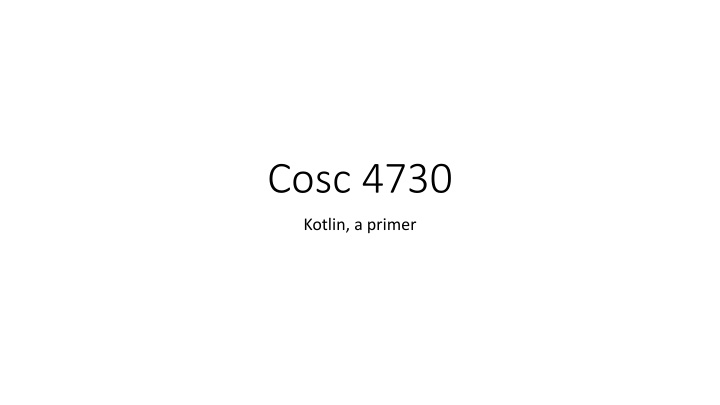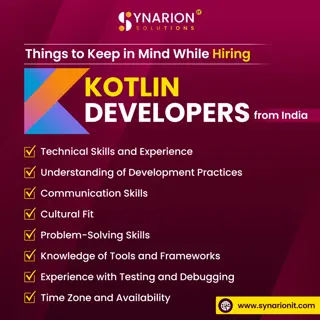
COSC 4730 Kotlin: A Primer Overview and Guide
Explore the basics of Kotlin, a primer for beginners delving into Android development within the Kotlin and Java frameworks. Learn about variable declaration, Kotlin formatting, data types, and string manipulation in this helpful guide.
Download Presentation

Please find below an Image/Link to download the presentation.
The content on the website is provided AS IS for your information and personal use only. It may not be sold, licensed, or shared on other websites without obtaining consent from the author. If you encounter any issues during the download, it is possible that the publisher has removed the file from their server.
You are allowed to download the files provided on this website for personal or commercial use, subject to the condition that they are used lawfully. All files are the property of their respective owners.
The content on the website is provided AS IS for your information and personal use only. It may not be sold, licensed, or shared on other websites without obtaining consent from the author.
E N D
Presentation Transcript
Cosc 4730 Kotlin, a primer
Kotlin, a primer This is not expected to be a complete guide to Kotlin, See references at the end It's to give you a flavor and be able to work with Kotlin within the android framework. So, somethings I'm covering, because android example's uses them, others I'm skipping, because either I've never seen them in android code, or it's simply not used. Also, Kotlin is still new to me as well, so I'm still learning Kotlin too. Kotlin is also in places a functional language, using higher-order methods. Lamba makes for less code in places, but also less clarity as what is happening. remember this is still an overlay of Java. Lastly, there is a Kotlin 2.0 coming "soon". Not sure what changes will happen. This is all Kotlin 1.X
Kotlin Formatting kotlin guide line. first the semicolons are optional, so line breaks are significant if you put to commands are the same line, you must use ; between them. You are supposed to use 4 space for indentation, never tabs For curly braces, put the opening brace in the end of the line where the construct begins, and the closing brace on a separate line aligned horizontally with the opening construct. The language design assumes Java-style braces, and you may encounter surprising behavior if you try to use a different formatting style. https://kotlinlang.org/docs/reference/coding-conventions.html
Variables A variable is declared with either var or val var is mutable (standard variable in java or c++) val is immutable after initialization (constant in c++ or final in java) declaring val/var <name>: <Type> [= initial value] var a: String = "Hello Word" //variable a of type string with an initial value val b: Int = 1 //constant integer variable b with the value of 1 val c = 3 //constant integer variable c with a value of 3, compiler determines type var MyVar: Int //variable MyVar of type integer MyVar = 2 //set the value.
Variables types Numbers Byte, Short (16 bits), Int (32 bits), Long (64 bits), Float (32 bits), Double (64 bits) 123 is assumed a Int, 123L is a long 123.5 is assumed a double, 123F or 123.5F is a float. Characters Char Character literals use signal quotes, '1' Strings are an Array of type Char, like c++ and java. and standard escape sequences, like \t, \b, \n, \r, \', \", \\ and \$ Boolean Boolean, which has two possible value: true and false operators like java/c++ || (or), && (and), ! (not)
Strings Unlike Java and C++, but more like some interpreted languages (like perl and others) Strings can interpolate inside of a doublequote strings uses take the value of variable within the double quotes var myVar1: String = "Jim" var myVar2: String myVar2 = "My name is $myVar1" produces "My name is Jim" myVar2 = "$myVar1 is of length ${myVar1.length}" produces "Jim is of length 3" myVar2 = "\$ stuff" produces "$ stuff" note you need to escape the $. Raw (or literal) strings use """ to denote start and stop. val variable = """ hi there """ last note, Raw strings use interpolation and don't support backslash escaping like \$, so ${'$'} will produce a $.
arrays arrays are declared like normal variables, it's about how they are initialized. uses either arrayOf() or Array(size) So var myArray: Int = arrayof(1,2,3,4) creates an array of size 4 with values 1,2 3,4. myArray[0] has the value of 1 var myArray: Int = Array(3) creates an empty array of size 3 Array also has a lambda expression constructor for the array Array(5, i -> i *2) produces an array of size 5, values [0, 2, 4, 6, 8]
arrays arrays are a class and have the following methods size (type Int) is the size of the array, (use size -1 to so don't overflow) get(index) return the value based on index or just use [index] set(index, value) or [index]= value there is also an iterator last note, there is also a special set of primitive arrays ByteArray, ShortArray, IntArray, etc. but likely just easier to use an Array.
collections (lists) like arrays, they have [] accessors, iterators, set, get operations like the java ArrayList, lists are dynamic sized val list1: List<Int> = LinkedList<Int>() //linked list implementation val list2: List<Int> = ArrayList<Int>() initializers. val a = arrayOf(1, 2, 3) a[0] = a[1] // OK val l = listOf(1, 2, 3) //immutable l[0] = l[1] // doesn't compile val m = mutableListOf(1, 2, 3) m[0] = m[1] // OK m.add(4) println(l.size) // 4
null safety In some languages, a reference type variable can be declared without providing an initial explicit value. In these cases, the variables usually contain a null value. Kotlin variables can't hold null values by default. This means that the following snippet is invalid: // Fails to compile val languageName: String = null For a variable to hold a null value, it must be of a nullable type. You can specify a variable as being nullable by suffixing its type with ?, as shown in the following example: val languageName: String? = null With a String? type, you can assign either a String value or null to languageName. You must handle nullable variables carefully or risk a dreaded NullPointerException. In Java, for example, if you attempt to invoke a method on a null value, your program crashes. Kotlin provides several mechanisms for safely working with nullable variables.
Flow Control If, when, for, and while are the basic flow control. We'll look at each in turn, since they function much like java and in ways not at all like java (actually more like c++). the If statement is actually an expression that returns value, so there is no ternary operator (condition ? then : else) normal if with a single statement if (a < b) c = 12 with else and/or multiple statements the {} blocks are REQUIRED. if (a < b) { c = 12 } else { c = 5 } It has the standard else if was well if () { } else if () { } else {}
if as an expression. Using an if as a ternary operator. var c = if (a > b) 12 else 5 since it's not a ternary operator we can do more, it just has to a return value for each side var c = if (a > b) { d = "a >b" 12 } else { d= "b > a" 5 }
switch/case statement, called when The when statement is a like a c++ switch case statement, but the break statement is needed. The when can be used like the if as an expression that needed to return a value. when(x) { 1 -> c = 23 2 -> c = 10 else -> { c = 0 d = 12 } } you can use , for multiple value 0,1 -> statement in .. is the range operator, with the ! as well in 1 ..10 - > "in the range" ! in 11 .. 15 -> "no in range" or function/method calls as well, just needs to return true or false x.isOdd() -> c = "odd" x.isEven() -> c = "even"
loops controls: while while loops work just like c++ and java while(x>0) { x-- } bottom testing, do .. while do { x-- } while (x >0) the break and continue operators are also supported in while (and for) loops
loops controls: for the for is nothing like c++ and java. it's more like foreach in c# and python the for loop iterates through anything that provides an iterator. var ints: int = arrayOf(1,2,3) for (item in ints) { } for (x in 1 ..3) { ..} we can also use a downTo and step operators for( x in 6 downTo 0 step 2) so 6, 4, 2, 0 are the values of x
loops controls: for (2) if you want to iterate with the index the array has a method indices for (x in array.indices) { // some statement with array[x] } or use the withIndex method for ( (index, value) in array.withIndex() ) { println("the element at $index is $value") }
loop control For more complex break, continue (and even a return) with labeling of loops see https://kotlinlang.org/docs/reference/returns.html
functions basics: fun name([ parameters,]): ReturnType { statements return Type } parameters are optional and so is the return fun generateAnswerString(countThreshold: Int): String = if (count > countThreshold) { "I have the answer" } else { "The answer eludes me" } fun generateAnswerString(countThreshold: Int): String { val answerString = if (count > countThreshold) { "I have the answer." } else { "The answer eludes me." } return answerString }
functions (2) anonymous functions We'll see a lot of anonymous functions in android. val stringLengthFunc: (String) -> Int = { input -> input.length } stringLengthFunc contains a reference to an anonymous function that takes a String as input and returns the length of the input String as output of type Int. For that reason, the function's type is denoted as (String) -> Int. calling the above function is the same val stringLength: Int = stringLengthFunc("Android")
functions (3) higher-order functions, ie functions that take functions as parameters In java, this would be a way to use the callback interface. fun stringMapper(str: String, mapper: (String) -> Int): Int { // Invoke function return mapper(str) } val name = stringMapper("Android", { input -> input.length })
class example: class Car { simple version with no constructor. class <name> { variables functions } Note, there is not a "new" keyword. val wheels = ArrayList<Wheel>() //public and Wheel is another class. private val doorLock: Int = 12 fun unlockDoor(key: Int): Boolean { return key == doorLock } } fun main() { val car = Car() // construct a Car val wheels = car.wheels // retrieve the wheels value from the Car }
class (2) constructors class Car (val wheels: List<Wheel>) { //note it's declared here. private val doorLock: Int = 12 fun unlockDoor(key: Int): Boolean { return key == doorLock } } val car = Car(ArrayList<Wheel>())
class (3) constructors class Car (val wheels: List<Wheel>) { //note it's declared here. private val doorLock: Int = 12 private var numWheels : int =0 fun unlockDoor(key: Int): Boolean { return key == doorLock } init { //this more like a classic java no parameter constructor. numWheels = wheels.size //use init to setup any local variables } } val car = Car(ArrayList<Wheel>())
class members Constructors and initializer blocks Functions Properties Nested and Inner Classes Object Declarations Companion classes and variables. Think static keyword in java. All classes in Kotlin have a common superclass Any, that is the default superclass for a class with no supertypes declared: class Example // Implicitly inherits from Any Any has three methods: equals(), hashCode() and toString(). Thus, they are defined for all Kotlin classes.
inheritance by default, all Kotlin classes are final (ie can't be inherited) open class Base //class can now be inherited to inherit (no constructor) open class Base() class Derived(): Base() with constructors open class Base(p: Int) class Derived(p: Int): Base(p) note a primary constructor must be initialized here.
inheritance (2): Overriding Methods things must be explicit in Kotlin. explicit modifiers for overridable members and for overrides: open class Shape { open fun draw() { /*...*/ } fun fill() { /*...*/ } } class Circle() : Shape() { override fun draw() { /*...*/ } } But fill() can not be overridden.
inheritance (2): Overriding variables. open class Shape { open val vertexCount: Int = 0 //set to zero, immutable } class Rectangle : Shape() { override val vertexCount = 4 //set to 4, immutable } class Polygon : Shape (){ override var vertexCount: Int = 0 // Can be set to any number later }
Interoperability Interoperability One of Kotlin s most important features is its fluid interoperability with Java. Because Kotlin code compiles down to JVM bytecode, your Kotlin code can call directly into Java code and vice-versa. This means that you can leverage existing Java libraries directly from Kotlin. Furthermore, the majority of Android APIs are written in Java, and you can call them directly from Kotlin. https://developer.android.com/kotlin/learn#interoperability But it doesn't always mean there is a one-to-one relation in the language though. Java threading is very different from Kotlin threading.
Android and Kotlin First, a Kotlin class can inherit a Java class. remember Kotlin is designed to be interoperable with java. part the pattern guide, which is used in the lecture and the next slide too. https://developer.android.com/kotlin/common-patterns Android's style guide, which android studio should also use https://developer.android.com/kotlin/style-guide
Side by side declaration of a fragment. public class LoginFragment extends Fragment { public LoginFragment() { class LoginFragment : Fragment() { // Required empty public constructor private lateinit var usernameEditText: EditText } private lateinit var passwordEditText: EditText @Override override fun onCreateView(inflater: LayoutInflater, public View onCreateView(LayoutInflater inflater, ViewGroup container, container: ViewGroup?, savedInstanceState: Bundle? Bundle savedInstanceState) { ): View? { // Inflate the layout for this fragment var view: View? = inflater.inflate(R.layout.fragment_login, container, false) View view = inflater.inflate(R.layout.fragment_login, container, false); usernameEditText =view?.findViewById(R.id.username_edit_text) usernameEditText = view.findViewById(R.id.username_edit_text); passwordEditText = view?.findViewById(R.id.password_edit_text) passwordEditText = view.findViewById(R.id.password_edit_text); return myView } return view; } } lateinit allows late assignment in onViewCreated, if used before initialized, Kotlin throws an Uninitialized PropertyAccessException. ? passes a null if needed, so it won't cause a null pointer exception. (may not be what you want though !! requires a non null value otherwise, it does through an exception.). }
References https://developer.android.com/kotlin/getting-started-resources https://developer.android.com/kotlin/learn https://kotlinlang.org/ https://kotlinlang.org/docs/tutorials/getting-started.html https://kotlinlang.org/docs/reference/basic-types.html https://kotlinlang.org/docs/reference/control-flow.html https://kotlinlang.org/docs/reference/classes.html https://kotlinlang.org/docs/reference/collections-overview.html https://play.kotlinlang.org/byExample/01_introduction/04_Null%20S afety
QA &











